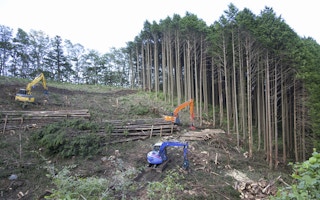Looking after the world’s tropical forests would be worthwhile in its own right, for the sake of their human and animal inhabitants and their wider effects on the natural world.
But researchers say it would also have a significant bonus. Properly cared for, the forests could cancel out between a quarter and a third of the planet’s carbon emissions.
They argue that it is not just outright destruction of the trees that is the problem, but the ways in which the forests become degraded by the incursion of different forms of development − logging, obviously, but also fires, mining, ranching, roads, and their effect in splitting the huge tracts of forested land into smaller and more isolated patches.
In a report commissioned by Prince Charles, the heir to the British throne, they say deforestation and degradation of the forests may account together for between 14 per cent and 21 per cent (1.4-2.2 gigatonnes of carbon, or GtC; a gigatonne is a billion metric tonnes) of all emissions of carbon, and perhaps even more if tropical peatlands and mangroves are included.
Atmospheric carbon
Against this, the forests absorb almost as much atmospheric carbon as they account for − an annual total of 1.2-1.8GtC, the authors say. But the report argues that simply offsetting the amount of carbon sequestered in this way against the amount emitted is insufficient, for two reasons.
“
It is an alarming fact that rates of deforestation and degradation continue to rise, and that the underlying causes of this increase are set to become very much more acute…
Prince Charles, the heir to the British throne
The first is the evidence that human activities are responsible for a significant proportion of CO2 absorption. Second, total emissions are probably much higher than the traditional greenhouse gas (GHG) accounting approach allows.
Taken together, these two factors suggest that slowing damage to the forests and keeping them in the best condition possible is more important than many people have realised.
But the forests continue to suffer damage. The report says: “…it can be argued that the causes and consequences of tropical forest degradation have been given too little attention, with the science now pointing toward degradation being a very significant component both of greenhouse gas emissions and the weakening of forest ecosystems”.
It paints a sobering picture of the present situation, saying there is “no sign yet that overall rates of deforestation or degradation are decreasing”. The report says the annual area of global forest lost is about 8.5m hectares.
Rising world demand for timber and wood products, and for farm produce, it says, “will significantly increase pressure on tropical forests over the next few decades”.
The report was commissioned by the Prince’s International Sustainability Unit. In a foreword, Prince Charles writes: “It is an alarming fact that rates of deforestation and degradation continue to rise, and that the underlying causes of this increase are set to become very much more acute…”
But he sounds an encouraging note: “We can act on forests now, therefore buying much-needed time to enable the transformation to a low-carbon economy.”
Considerable uncertainty
There is considerable uncertainty about how much the forests contribute to GHG emissions. In 2012, NASA said that tropical deforestation had accounted for about 10 per cent of human carbon emissions from 2000 to 2005 − a much lower figure than previous estimates.
Forest degradation is often more difficult to detect than deforestation itself, and is almost invisible to satellite monitoring. Research in six tropical countries suggests that degradation by logging can cause significant damage, with GHG emissions on average about 12 per cent of those caused by deforestation.
Together, their impact is serious. The Global Forest Watch online monitoring network says that Brazil lost 5.9 per cent of its forest cover between 2001 and 2012, while Indonesia lost 9.2 per cent over the same timespan.










